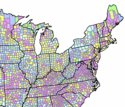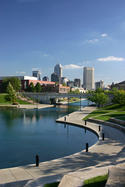To much of the media, Barack Obama is the ultimate dream president, a sophisticated urbanite whose roots lie in top-tier academia and big-city politics. This asset could also become a glaring weakness, blinding him to the fundamental aspirations for smaller places and self-government that have long animated the American experience. read more »
Is Obama's Urban Focus Bad News for the Rest of the Countryside?
NEW GEOGRAPHY SPECIAL REPORT: America’s Ever Changing Demography
America’s demography tells not one story, but many. People concerned with looking at long-term trends need to familiarize themselves with these realities – and also consider whether these will continue in the coming decades.
Losers and Winners read more »
The Former East Germany: Is It Time for Red Nostalgia?
2009 marks the 20th anniversary of the reunification of East and West Germany into one country. Germany was divided into two separate nations with competing economic and political ideologies. Now it’s time to reassess the results of this melding of two very different systems and the impact on the urban environment.
Emerging from the ashes as one of the world’s most powerful economies, Germany may be the quintessential example of the triumph of capitalism over communism. Yet now with Frankfurt’s powerful banking sector reeling from the global economic meltdown, reticent Marxists may well be coming out of the woods to proclaim the death of capitalism. read more »
The New Business Ethos
My only post-graduate employment lasted 3 months. I worked for a small political consulting firm drafting online strategy for a well-funded land-use initiative. After the success of the measure, the firm’s founder sat me down, told me he loved my work but that the firm was not interested in continuing its web-based consulting. He had to let me go. It was in that same meeting that I decided to start – and pitched to my boss – my own business. read more »
One Fundamental Problem: Too Many People Own Homes
Ben Bernanke made the following statement as he attempted to justify bailing out bad borrowers:
“…from a policy point of view, the large amount of foreclosures are detrimental not just to the borrower and lender but to the broader system. In many of these situations we have to trade off the moral hazard issue against the greater good.” – Ben Bernanke, February 25, 2009
I think he is wrong on this, and the moral hazard issue is only a small part of my objections. read more »
Sunbelt Indianapolis
For decades, the overwhelming majority of population and economic growth has occurred in the Sun Belt – the nation’s South and West as defined by the United States Bureau of the Census. This broadly-defined area stretches south from the Washington-Baltimore area to the entire West, including anything but sunny Seattle and Portland. Any list of population growth or employment growth among the major metropolitan areas will tend to show the Sun Belt metropolitan areas bunched at the top and the Frost Belt areas (the Northeast and Midwest regions) bunched at the bottom. read more »
Don't Mess With Census 2010
The announcement last week that Congressional Black Caucus members plan to press President Obama to keep the 2010 census under White House supervision, even if the former Democratic Governor of Washington, Gary Locke, is confirmed as Commerce Secretary, brought back memories of a movie I’d seen before — a bad movie. read more »
Bernanke: Junkmeister Hides the Truth
Federal Reserve Chairman Ben Bernanke testified before the Senate Budget Committee on Tuesday (March 3, 2009), the day after it was announced that AIG would be back at the federal teat for another $30 billion. The generally subdued Senate was nonetheless forceful in getting Bernanke to admit several things: read more »
- Login to post comments
Urban Inequality Could Get Worse
President Obama's stated objective to reduce inequality, as laid out in public addresses and budget plans, is a noble one. The growing income gap – not only between rich and poor, but also between the ultra-affluent and the middle class – poses a threat both to the economy and the long-term viability of our republic.
But ironically, what seems to be the administration's core proposal, ratcheting up the burden on "rich" taxpayers earning over $250,000, could have unintended consequences. For one thing, it would place undue stress on the very places that have been Obama's strongest supports, while providing an unintended boost to those regions that most oppose him. read more »
The Aging of Paradise in Ventura County California
You could say that Ventura County, just north of Los Angeles, represents what is best about California. Some people believe that its amenities – beaches, gorgeous interior valleys and parks – assure perpetual economic growth for Ventura County and California. They are wrong. There is trouble in paradise.
Ventura County has changed, and not for the better. It is aging, losing its demographic as well as economic vitality. This represents a relatively new phenomenon, the slow decline of even formerly healthy suburban areas. read more »
- Login to post comments






















